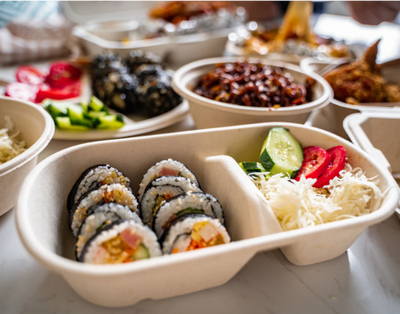The food and beverage (F&B) and hospitality industries have long been celebrated for creating memorable experiences—whether it’s a family dinner, a romantic getaway, or a luxury hotel stay. But behind the scenes, these industries also carry a monumental environmental footprint. From staggering amounts of food waste and inefficient energy use to the reliance on single-use plastics for takeaways and amenities, the impact is significant.
Now, as consumer demand for sustainability grows louder, change is no longer optional—it’s essential. Restaurants, cafés, and hotels are rapidly transforming their operations, embracing innovative eco-friendly practices that reduce their footprint while appealing to a new generation of conscious customers.
This article explores how the FnB and hospitality industries are going green in 2025, and why sustainability is not just good for the planet, but good for business too.
The Problematic Past
Before the sustainability shift, the FnB and hospitality sectors were among the largest contributors to environmental waste.
-
Food Waste: Globally, about 1.3 billion tons of food are wasted each year, much of it from restaurants, hotels, and catering services. In the U.S. alone, restaurants generate an estimated 11 million tons of food waste annually.
-
Energy and Water Consumption: Commercial kitchens and hotels are notoriously energy-intensive, with industrial ovens, refrigerators, laundry facilities, and 24/7 operations driving up emissions. Hotels are also among the largest per-capita water users of any commercial sector.
-
Plastic Dependence: Takeaway packaging, disposable cutlery, plastic straws, mini toiletry bottles, and shrink-wrapped amenities have been the norm for decades, generating millions of tons of waste each year.
These practices not only harm the environment but also erode consumer trust in an age where transparency and responsibility matter. The good news? Change is well underway.
Sustainable Swaps in the Kitchen
The heart of every restaurant or hotel lies in its kitchen—and that’s where many of the most impactful changes are happening.
1. Reducing Food Waste
Chefs and operators are embracing smarter inventory management systems to track ingredients, predict demand, and minimize spoilage. Apps and AI-powered tools now help kitchens order just the right amount of produce, cutting down on excess.
Other practices include:
-
Smaller portion options to reduce plate waste.
-
Upcycling ingredients (e.g., turning vegetable scraps into stocks or citrus peels into syrups).
-
Donating surplus food to local charities.
2. Composting Programs
Instead of sending organic waste to landfills, many restaurants are partnering with composting services—or even starting their own in-house compost bins. This not only diverts waste but creates valuable soil for local farms and gardens.
3. Zero-Waste Kitchens
Some pioneering restaurants are pushing for zero-waste kitchens, where every ingredient is used creatively, and packaging is minimized or eliminated altogether. These businesses often double as education hubs, inspiring both customers and staff to rethink food waste.
The Plastic-Free Dining Experience
Plastic has long been a hallmark of convenience in the FnB industry—but it comes at an enormous cost. The tide is turning, and diners increasingly expect plastic-free experiences that align with their values.
Key sustainable swaps include:
-
Compostable cutlery and straws: Brands like EQUO provide plant-based alternatives made from sugarcane, coffee grounds, or coconut, offering sturdy, safe, and stylish options without plastic waste.
-
Eco-friendly packaging: Takeaway containers are shifting from polystyrene foam to compostable paper or bagasse (sugarcane fiber).
-
Reusable serviceware: Cafés and restaurants are incentivizing customers to bring their own mugs, bottles, and containers.
Not only are these shifts better for the environment, they enhance the customer dining experience. No more soggy paper straws or cheap plastic forks—eco-alternatives are proving that sustainability can be practical, durable, and enjoyable.
Green Hotels and Eco-Conscious Travel
Hotels, resorts, and other hospitality providers are rethinking their role in sustainability as travelers increasingly seek eco-conscious stays. A 2024 Booking.com survey revealed that 80% of travelers want to stay in sustainable accommodations, and hotels are responding.
1. Linen and Towel Reuse Programs
Encouraging guests to reuse linens and towels is now standard practice, reducing water and energy use from laundry facilities.
2. Low-Flow Fixtures and Energy Efficiency
Hotels are investing in low-flow showerheads, energy-efficient lighting, and smart thermostats, helping reduce utility costs while minimizing their footprint.
3. Plastic-Free Toiletries
The era of mini shampoo bottles is ending. Many hotels are replacing single-use toiletries with refillable dispensers, eliminating thousands of bottles per property each year.
4. Locally Sourced and Plant-Based Menus
Eco-conscious hotels are featuring menus that prioritize seasonal, local, and plant-based options—reducing the emissions tied to food transportation and catering to the growing demand for sustainable dining.
Together, these measures redefine luxury: no longer about excess, but about conscious choices that protect the destinations travelers love to visit.
A Competitive Advantage
Sustainability in the FnB and hospitality industries is more than a moral obligation—it’s a powerful business strategy.
Here’s why going green pays off:
-
Consumer Loyalty: Today’s customers—especially Gen Z and Millennials—are willing to pay more for eco-friendly options and are more loyal to brands that align with their values.
-
Operational Savings: Energy-efficient equipment, food waste reduction, and water-saving initiatives lower long-term costs.
-
Regulatory Compliance: With plastic bans and environmental policies expanding globally, early adopters are better prepared for compliance.
-
Brand Reputation: Sustainability sets businesses apart in competitive markets, positioning them as leaders rather than laggards.
Forward-thinking brands like EQUO are making this transition easier by offering accessible, compostable alternatives for restaurants, cafés, and hotels. From straws and utensils to takeout packaging, these eco-friendly products empower businesses to reduce their footprint without compromising on convenience or quality.
Conclusion
The FnB and hospitality industries are entering a new era—one where sustainability isn’t an afterthought but a core business value. By tackling food waste, eliminating plastics, embracing renewable energy, and reimagining customer experiences, restaurants and hotels are proving that going green is both possible and profitable.
For consumers, this transformation means enjoying meals, vacations, and experiences that feel good in every sense—delicious, memorable, and aligned with a healthier planet.
For businesses, it’s an opportunity to win loyalty, cut costs, and future-proof operations. And with innovative solutions from companies like EQUO, creating a plastic-free, eco-conscious future is more achievable than ever.
The next time you dine out or book a hotel, remember: every sustainable choice contributes to a greener industry, and together, we’re rewriting the future of hospitality.


